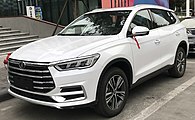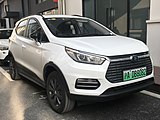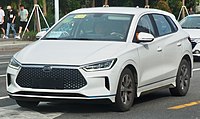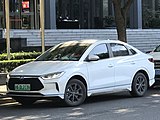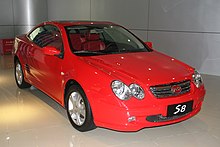BYD Auto: Difference between revisions
Albertaont (talk | contribs) →BYD Design Center: failed verification |
|||
| Line 100: | Line 100: | ||
File:BYD Yuan facelift 002.jpg|BYD Yuan |
File:BYD Yuan facelift 002.jpg|BYD Yuan |
||
File:2019 BYD e2.jpg|BYD e2 |
File:2019 BYD e2.jpg|BYD e2 |
||
File:BYD e3 001.jpg|BYD e3 |
|||
</gallery> |
</gallery> |
||
Revision as of 07:44, 10 November 2020
 | |||||||
Native name | 比亚迪汽车 | ||||||
|---|---|---|---|---|---|---|---|
| Company type | Subsidiary | ||||||
| Industry | Automotive | ||||||
| Founded | 2003 | ||||||
| Headquarters | , China | ||||||
Area served | Worldwide | ||||||
| Products | Automobiles Buses Electric bicycle Truck Forklift Rechargeable batteries | ||||||
| Revenue | CNY 64.9 Billion (2019)[1] | ||||||
| Parent | BYD Co Ltd | ||||||
| Subsidiaries | Shenzhen BYD Daimler New Technology Co., Ltd. (50%) Shenzhen BYD Auto Co. Ltd. Changsha BYD Auto Co. Ltd. Shaoguan BYD Auto Co. Ltd. BYD Auto Sales Co., Ltd. BYD. Mitsubishi Motors Co.Ltd (Wesing Motors) | ||||||
| Chinese name | |||||||
| Simplified Chinese | 比亚迪汽车 | ||||||
| Traditional Chinese | 比亞迪汽車 | ||||||
| |||||||
| Website | www byd | ||||||
BYD Auto Co., Ltd. is the automotive subsidiary of the Chinese multinational BYD Co Ltd,[2] which is based in Xi'an, Shaanxi Province.[3] It was founded in January 2003, following BYD Company's acquisition of Tsinchuan Automobile Company in 2002.[4][5] The company produces automobiles, buses, electric bicycles, forklifts, rechargeable batteries and trucks. The current model range of automobiles includes electric vehicles, plug-in hybrids and petrol-engined vehicles.
The Denza brand, a joint venture with Daimler AG, produces luxury electric cars.

History


BYD Co Ltd created the wholly owned subsidiary BYD Auto a year after its 2002 acquisition of the Norinco-owned Qinchuan Machinery Works,[6] which may have been made solely to acquire the passenger car production license held by the purchased company.[7] Qinchuan had been manufacturing cars since 1987, when the company began production of the 0.5 L (30.5 cu in) QJC7050 model.[8] At the time of the acquisition, the QCJ7181 Flyer was in production, which from 2005 was rebadged to the "BYD Flyer."
In 2008, a plugin hybrid version of the BYD F3 compact sedan was introduced.[9] Total sales in 2009 were 448,400 vehicles.[10] In the same year, BYD began the export of its cars to Africa, South America and the Middle East, where the cars competed on price, not quality.[11]
In 2012, the municipal government of Shenzhen purchased 500 BYD E6 cars for use as taxis.[12] A total of 506,189 passenger cars were sold in China in 2013, making it the tenth-largest selling brand.[13]
In 2013, BYD was awarded The Top Crash Facility Award of the year 2013.[14]
In 2014, the BYD Qin plug-in hybrid had total sales of 14,747 (plus a relatively small number of sales in Latin America),[15][16] In 2015, sales of the Qin increased to 31,898[17] and the Qin was the 88th highest selling sedan in China.[18] In 2016, the BYD Tang plug-in hybrid SUV had 31,405 sales, the plug-in hybrid version of the Qin compact sedan had 21,868 sales and the BYD e6 electric compact MPV had 20,605 sales.[19] By 2016, total sales of the Qin were 68,655 cars.[19][20]

In 2015, the company was planning to open factories in Brazil to produce electric cars and buses.[21] In July 2015, exports to Russia were suspended, due to the war in Ukraine and the falling value of the Russian currency.[22] BYD was the highest selling brand of highway legal light-duty plug-in electric vehicles (combined sales for plug-in hybrids and battery electric cars),[23] with 61,772 passenger vehicles sold, mostly plug-in hybrids.[24] BYD continued as the world's top selling plug-in car manufacturer in 2016 with over 100,000 units sold, up 64% from 2015. BYD sold more than 100,000 new energy passenger cars in China in 2016. The BYD Tang was the top selling plug-in car in China in 2016 with 31,405 units delivered.
BYD achieves top rankings of 2015 J.D Power's Quality Study.[25]
In September 2016, the company became the third largest manufacturer of plug-in cars, with a total of 161,000 plug-in cars produced since 2008.[26] Also in September 2016, the company introduced a range of electric sanitation truck models, to be used in Beijing.[27]
Since 2017, BYD has been negatively impacted by a reduction of subsidies that were granted by the Chinese government.[28][29][30][31]
In May 2020, BYD announced that it would start expanding in Europe, with Norway first. BYD's launch will consist of the Tang SUV and a range of commercial vehicles.[32] however, Australia also announced that there will be 2000 BYD electric vehicles in the fleet, it will be in the part of the new Taxi operator ETaxiCo. The fleet will be operated from three sites in the Northern Beaches Council area as part of a six month trial, When the program launches – which is at this current time planned for next month depending on COVID-19 factors – it will be using 15 specially fitted e6 electric compact SUVs made by Warren-Buffet backed EV and battery maker BYD that have been imported by Nexport, with plans to expand the fleet to 120 by August. [33]
Products
Former models
- BYD F0 supermini (petrol engine)
- BYD F6 mid-size saloon
- BYD Flyer city car (2003–2008)
- BYD G3 compact saloon
- BYD G3-R compact hatchback
- BYD G5 compact saloon successor to the BYD G3
- BYD G6 mid-size sedan
- BYD L3 (or New F3)[34] - compact saloon
- BYD F5 Surui compact sedan (petrol engine), which was a variant of the F3 and the basis for the e5
- BYD F3-R compact hatchback
- BYD M6 MPV
- BYD S6 SUV
- BYD S7 SUV
- BYD S8 convertible
Current cars
- BYD e1 city car based on the F0 (electric vehicle)
- BYD S2 subcompact SUV based on the Yuan (electric vehicle)
- BYD e2 compact hatchback (electric vehicle)
- BYD e3 compact sedan (electric vehicle)
- BYD e5 compact sedan (electric vehicle)
- BYD e6 compact MPV (electric vehicle)
- BYD F3 compact sedan (petrol engine)
- BYD Han mid-size sports sedan (plug-in hybrid / electric vehicle)
- BYD Qin compact sedan (petrol engine / plug-in hybrid / electric vehicle
- BYD Song compact SUV (petrol engine / plug-in hybrid / electric vehicle)
- BYD Song Max MPV (petrol engine / plug-in hybrid / electric vehicle)
- BYD Tang mid-size SUV (petrol engine / plug-in hybrid / electric vehicle)
- BYD Yuan subcompact SUV (electric vehicle)
-
BYD Qin
-
BYD Qin Pro
-
BYD Tang
-
BYD Song
-
BYD Song Max
-
BYD Song Pro
-
BYD Yuan
-
BYD e2
-
BYD e3
Current transit buses

- BYD K6 electric bus (7m/23 ft)[35]
- BYD K7 electric bus (8m/26 ft)[35]
- BYD K8 electric bus (10.5m/35 ft)[35]
- BYD K9 electric bus (12m/40 ft)[35]
- BYD K10 electric bus (double decker, 10m/32 ft)[35]
- BYD K11 electric bus (articulated, 18m/60 ft)[35]
Current coaches

- BYD C6 electric coach (7m/23 ft)[35]
- BYD C8 electric coach (10.5m/35 ft)[35]
- BYD C9 electric coach (12m/40 ft)[35]
- BYD C10 electric coach (14m/45 ft)[35]
Current vans
Current trucks

- BYD T5 (Class 5 electric truck)[38]
- BYD T7 (Class 6 electric truck)[38]
- BYD T8 (Class 8 electric truck)
- BYD T10 (Class 8 electric truck)
- BYD 8TT (Class 8 electric semi-truck)
- BYD Q1M / BYD 8Y (Class 8 Terminal tractor)[38][39][40]
BYD Design Center
In 2019, BYD launched its global design center, which is led by a team of industry veterans from Audi, Ferrari, and Mercedes-Benz. Leading the team is Wolfgang Egger. The carmaker unveiled its E-SEED GT, the first joint effort from the new design team, at the Auto Shanghai industry show in April 2019. The futuristic design concept reflects the sleek lines of the Chinese dragon, and the company plans to feature more Chinese cultural symbols in future models.[41]
BYD Auto had been accused of taking designs from other manufacturers. Articles claimed BYD F1 "is a clear copy of the Toyota Aygo,"[42] that the BYD S6 "closely apes the Lexus RX",[43] the BYD F3 "is a copycar of the Toyota Corolla[44] the BYD S8 has a similar appearance to a Mercedes-Benz SL-Class,[45] and the BYD F8 "features an almost identical Mercedes-Benz CLK front-end and Renault Megane CC rear".[46] Although the U.S. government had been advised by its consul-general in Guangzhou, China that BYD uses an approach of "copying and then modifying car designs." Chinese courts ruled BYD has not infringed on patents.[47]
Settled Albuquerque bus claim
In December 2018, the Albuquerque council filed a lawsuit against BYD for "issues including bolts falling off doors, doors opening on their own and battery range issues".[48] BYD disputed the city's allegations and disputed Mayor Tim Keller's "false and misleading statements." [49] The lawsuit was settled with no money changing hands. A joint statement was issued in May 2019.[50]
Facilities
Facilities consist of two manufacturing plants in Xi'an, an R&D center and manufacturing plant in Shenzhen (the headquarters of BYD Co Ltd), a manufacturing plant in Changsha, a manufacturing plant in Shaoguan, and an R&D center and parts plant in Shanghai.[51] Construction of a third manufacturing plant in Xi'an resumed in 2011, following the company being fined for illegal land use.[52]
Manufacturing plants for buses opened in Dalian, Liaoning province in late 2014[53] and Lancaster, California in May 2013.[54][55]
Denza joint venture
In May 2010, the Shenzhen BYD Daimler New Technology Co., Ltd., trading as "Denza" was established with Daimler AG[56] to produce luxury electric vehicles.[57] The Denza 500 model is based on the previous generation Mercedes-Benz B-Class.[58]
Toyota joint venture
On April 2nd 2020, BYD and Toyota announced a new joint venture between the two companies with the aim of "developing BEVs (Battery Electric Vehicles) that appeal to customers."[59] This is partially due to the fact that Toyota, despite being among the first automotive manufacturers to start developing Hybrid vehicles, has been the slowest in the industry to move towards fully electric ones.[60] This reluctance to move to electric vehicles has lead to the world's largest automotive company lagging behind other large competitors in terms of its ability to produce electric cars, which is why they have partnered with BYD.[61]
The new company is to be called BYD TOYOTA EV TECHNOLOGY CO., LTD., with it's head office in Shenzhen, Guangdong Province. The CEO of the company Zhao Binggen commented:[62]
“This joint venture company will focus on the research and development of battery electric vehicles with technology and know-how from both China and Japan. The company is committed to promoting and populating high-quality technologies that make battery electric vehicles more environmentally friendly, safe, comfortable, and intelligent. Our vision is to create a future customer-first mobility style, and a harmonious society for humans and nature.”
This joint venture should help Toyota's goal to have half of its total sales to be in electrified vehicles by the year 2025. [63]
Sales
In 2010, BYD Auto sold a total of 519,800 vehicles, representing 2.9% of the market in China and the sixth largest manufacturer.[51][64] In 2011, the BYD sales rank was outside the top ten.[65] In 2012, the company became the 9th largest car manufacturer in China, producing over 600,000 vehicles.[66]
The majority of vehicles are sold within China, however export markets include Bahrain, the Dominican Republic,[67][68] Ukraine[69] and Moldova.[70]
The North American headquarters opened in Los Angeles in 2011.[71] As of 2013 BYD Auto sells the e6 and Electric Bus in the United States as fleet vehicles only. BYD has supplied the Los Angeles Metro system with buses since 2015. A 2018 investigation by the Los Angeles Times found reliability issues with the BYD buses.[72]
See also
References
- ^ . BYD Company Limited Company Limited Annual Report 2019 https://www.byd.com/sitesresources/common/tools/generic/web/viewer.html?file=%2Fsites%2FSatellite%2FBYD%20PDF%20Viewer%3Fblobcol%3Durldata%26blobheader%3Dapplication%252Fpdf%26blobkey%3Did%26blobtable%3DMungoBlobs%26blobwhere%3D1541999564013%26ssbinary%3Dtruetitle=BYD Company Limited Annual Report 2019.
{{cite web}}: Check|url=value (help); Missing or empty|title=(help) - ^ "BYD USA · Build Your Dreams · International Manufacturer of Electric Cars, Trucks, Buses, Forklifts, Monorail, and Battery Systems". BYD USA.
- ^ "BYD Contacts". BYD Auto. Archived from the original on 1 April 2018. Retrieved 30 November 2018.
- ^ "About BYD". BYD Auto. Archived from the original on 11 February 2012.
- ^ Anne C. Lee (17 February 2010). "Most Innovative Companies - 2010: BYD". Fast Company. Archived from the original on 17 February 2012.
- ^ "Company Profile". BYD Auto. Archived from the original on 26 August 2009.
- ^ Chang, Crystal (9 August 2009), Developmental Strategies in a Global Economy: The Unexpected Emergence of China’s Independent Auto Industry, p. 13, SSRN 1450117
- ^ Van Ingen Schenau, Eric (2008). "Catalogue of the Present Chinese Motorcar Production" (PDF). Ortaffa, France: China Motor Vehicle Documentation Centre. p. 36. Archived from the original (PDF) on 4 March 2016.
- ^ Scott Doggett (23 March 2010). "BYD Auto to Offer F3DM Plug-in Hybrid to Chinese Individuals Starting Next Week". AutoObserver. Archived from the original on 30 March 2010.
- ^ Antony Marceles (20 January 2010). "2009 Chinese Auto Sales". Nitrobahn. Archived from the original on 14 July 2011.
- ^ Marc Gunther (13 April 2009). "Why Warren Buffett is investing in electric car company BYD". CNNMoney. Archived from the original on 27 April 2009.
- ^ Ma, Nan (6 September 2012). "Pure EV lured by wealthy Chinese markets". The Morning Whistle. Archived from the original on 17 January 2013. Retrieved 2 April 2013.
- ^ "2013 Passenger Vehicle Sales by Brand". China Auto Web. 15 January 2014. Retrieved 22 February 2014.
- ^ BusinessWire (18 November 2013). "BYD Wins ATTI Crash Test Facility of the Year". BusinessWire.
{{cite news}}:|author=has generic name (help) - ^ Staff (14 January 2015). "2014 EV Sales Ranking". China Auto Web. Retrieved 17 January 2015.
- ^ Jeff Cobb (10 February 2015). "Top-10 Global Best-Selling Plug-in Cars". HybridCars.com. Retrieved 21 March 2015. A total of 14,747 Qins were sold in China in 2014.
- ^ Cobb, Jeff (12 January 2016). "Tesla Model S Was World's Best-Selling Plug-in Car in 2015". HybridCars.com. Retrieved 23 January 2016. The Tesla Model S was the top selling plug-in electric car in 2015 (50,366), followed by the Nissan Leaf (about 43,000), the Mitsubishi Outlander P-HEV (about 39,000), the BYD Qin (31,898) and the BMW i3 (24,057).
- ^ Staff (14 January 2016). "Best-selling Sedan in 2015". China Auto Web. Retrieved 17 January 2016. A total of 31,898 Qins were sold in China in 2015.
- ^ a b Staff (19 January 2017). "Best-selling China-made EVs in 2016". China Auto Web. Retrieved 25 January 2017. Three BYD Auto models topped the Chinese ranking of best-selling new energy passenger cars in 2016. The BYD Tang SUV was the top selling plug-in electric car in China in 2016 with 31,405 units sold, followed by the BYD Qin with 21,868 units sold, and ranking third overall in 2016 was the BYD e6 with 20,605 units.
- ^ Cobb, Jeff (17 October 2016). "China Now Ties US For Leadership In Cumulative Global Plug-In Sales". HybridCars.com. Retrieved 17 October 2016.
- ^ Wang, Joey. "BYD to open passenger car Factory in Brazil". CarNewsChina.com. CarNewsChina. Retrieved 8 March 2015.
- ^ "CHINA: BYD stops exports to Russia". www.just-auto.com. 1 July 2015.
- ^ John Voelcker (15 January 2016). "Who Sold The Most Plug-In Electric Cars In 2015? (It's Not Tesla Or Nissan)". Green Car Reports. Retrieved 17 January 2016.
- ^ Natasha Li (4 March 2016). "Alternative Energy Vehicles Account HALF of BYD's Profits for the Very First Time in 2015". Gasgoo Automotive News. Archived from the original on 8 March 2016. Retrieved 7 March 2016. BYD Auto delivered 69,222 new energy vehicles in China in 2015, including buses, of which, a total of 61,722 were passenger vehicles, mostly plug-in hybrids, led by the Qin and Tang.
- ^ PRNewswire (13 November 2015). "BYD Ranks at Top of J.D.Power's Quality Study". PRNewswire.
- ^ Cobb, Jeff (7 November 2016). "China's BYD Becomes World's Third-Largest Plug-in Car Maker". HybridCars.com. Retrieved 7 November 2016.
- ^ "BYD, Beijing Sanitation Group Launch Electric Trucks". Retrieved 30 October 2016.
- ^ "For some Chinese companies, generous state subsidies make up for losses". Nikkei Asian Review.
- ^ Haley, Usha C. V. Haley and George T. (25 April 2013). "How Chinese Subsidies Changed the World" – via hbr.org.
- ^ Huang, Echo. "The worst is not yet over for BYD". Quartz.
- ^ Huang, Echo. "Beijing's subsidy cut is starting to hurt China's largest electric car company". Quartz.
- ^ "BYD begins expansion in Europe, with Norway first". Autocar.
- ^ Schmidt, B. (Ed.). (2020, April 29). Zero contact and zero emissions: "Covid safe" electric taxis to launch in Sydney. Retrieved October 25, 2020, from https://thedriven.io/2020/04/28/zero-contact-and-zero-emissions-covid-safe-electric-taxis-to-launch-in-sydney/
- ^ "BYD L3 going on sale in Laos". BYD Auto. 28 January 2013. Archived from the original on 15 January 2014. Retrieved 7 March 2013.
- ^ a b c d e f g h i j "BYD Claims Production of 10,000th Pure Electric Bus-news-www.chinabuses.org". www.chinabuses.org. Retrieved 30 October 2016.
- ^ "BYD Auto, Build Your Dreams!". bydeurope.com. Archived from the original on 27 January 2019. Retrieved 30 October 2016.
- ^ "While Tesla Tackles Cars, BYD Attacks Diesel Emissions With New Truck Line". CleanTechnica. 3 May 2016. Retrieved 30 October 2016.
- ^ a b c "TRUCK – BYD USA". www.byd.com. Archived from the original on 30 October 2016. Retrieved 30 October 2016.
- ^ "Q1M brochure" (PDF). Archived from the original (PDF) on 1 December 2017. Retrieved 30 November 2018.
- ^ O'Dell, John (13 March 2017). "First of 27 BYD Electric Trucks Deployed at California Freight Yard". Retrieved 21 November 2017.
- ^ "BYD takes aim at high-end market with bold design strategy". technode.com. 27 June 2019. Retrieved 22 July 2019.
- ^ "BYD's bid to break the Chinese mould". www.easier.com. Retrieved 21 April 2019.
- ^ "RX for Success... or lawsuit? China's BYD gets its Lexus tribute on". www.autoblog.com. Retrieved 21 April 2019.
- ^ "Upcoming Releases: S6, Another Copycar from BYD?". www.chinaautoweb.com. Retrieved 21 April 2019.
- ^ "BYD S8 Convertible: A Chinese Chopstick Dumpling Deathtrap". www.jalopnik.com. Retrieved 21 April 2019.
- ^ "Another Chinese copy, the BYD F8". www.motorauthority.com. 26 June 2018. Archived from the original on 26 June 2018.
- ^ "Special Report: Warren Buffett's China car deal could backfire". www.reuters.com. 9 March 2011. Retrieved 21 April 2019.
- ^ "Albuquerque files lawsuit against ART bus vendor". www.koat.com. 8 December 2018. Retrieved 21 April 2019.
- ^ "City, maker of electric ART buses settle suit". albuquerquejournal.com. 31 May 2019. Retrieved 22 July 2019.
- ^ "Joint Statement on Albuquerque Bus Project". en.byd.com. 19 July 2019. Retrieved 22 July 2019.
- ^ a b Norihiko Shirouzu (14 October 2010). "Beijing Halts Construction of BYD Auto Plant". The Wall Street Journal.
- ^ "BYD says to restart construction of China Xi'an plants". Reuters. 5 April 2011.
- ^ 港媒:比亚迪纯电动巴士大连下线 电池项目已正式启动. 凤凰财经 (in Chinese). Retrieved 29 December 2014.
- ^ Shahan, Zachary (6 May 2003). "Two BYD Manufacturing Facilities Launched In Lancaster". EV Obsession. Retrieved 10 February 2016.
- ^ "BYD delivers first massive 60-ft all-electric bus in the US: 275 miles range on 547 kWh battery pack". 4 May 2017. Retrieved 4 May 2017.
- ^ "Daimler, BYD hope luxury Denza will spark China e-car sales". reuters.com. Thompson Reuters. 17 May 2012. Retrieved 23 November 2012.
- ^ "BYD and Daimler in EV Joint Venture". ChinaAutoWeb. 27 May 2010.
- ^ Steitz, Christoph (24 March 2012). "Daimler to present electric car for China-magazine". reuters.com. Thompson Reuters. Retrieved 23 November 2012.
- ^ Lambert, Fred (2 April 2020). "Toyota launches new electric car company with BYD". Electrek. Retrieved 28 September 2020.
- ^ "Toyota Is Losing the Electric Car Race, So It Pretends Hybrids Are Better". DeSmog. Retrieved 28 September 2020.
- ^ "The race to the electric car is just getting started". www.cnn.com. Retrieved 28 September 2020.
- ^ CORPORATION, TOYOTA MOTOR. "BYD, Toyota Launch BYD TOYOTA EV TECHNOLOGY Joint Venture to Conduct Battery Electric Vehicle R&D | Corporate | Global Newsroom". Toyota Motor Corporation Official Global Website. Retrieved 28 September 2020.
- ^ "Toyota & BYD Officially Launch Joint Venture Company to Build Electric Vehicles in China". www.futurecar.com. Retrieved 28 September 2020.
- ^ Bertel Schmitt (19 January 2011). "China Car Market 101: Who Makes All Those 18 Million Cars?". The Truth About Cars.
- ^ 2011年前十家乘用车生产企业销量排名. China Association of Automobile Manufacturers (CAAM). 20 January 2012. Archived from the original on 20 August 2012.
- ^ "2012年12月分车型前十家生产企业销量排名". China Association of Automobile Manufacturers (CAAM). 14 January 2013. Archived from the original on 15 January 2013. Retrieved 15 January 2013.
- ^ "Peravia Motors presenta al mercado dominicano nueva marca de vehículos BYD" (in Spanish). El Nuevo Diario. 11 February 2010. Archived from the original on 4 October 2011. Retrieved 19 April 2011.
- ^ "Dominican capital turns Chinese yellow, with taxis". DominicanToday.com. 5 February 2010. Archived from the original on 22 March 2012.
- ^ "China's automaker BYD launches its brand in Ukraine". Xinhua. 26 October 2011.
- ^ "Auto Centru Elita 5, BYD dealer in Chisinau, Moldova". Archived from the original on 12 April 2012.
- ^ "BYD Opens U.S. Headquarters In Los Angeles". Edmunds. 25 October 2011. Retrieved 7 March 2013.
- ^ John, Paige St (20 May 2018). "Stalls, stops and breakdowns: Problems plague push for electric buses". Los Angeles Times. Retrieved 23 August 2018.






